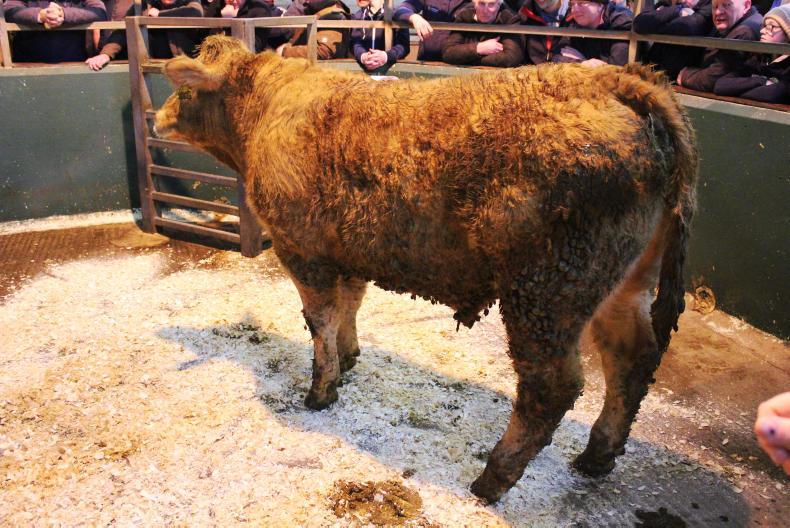The Ulster Farmers’ Union (UFU) has set out a long list of potential measures that could be introduced as part of a future domestic agricultural policy post-Brexit.
The aim of the document, launched at the Balmoral Show last week, is to stimulate debate over the coming months, with a view to finalising a UFU position so that the organisation can properly represent the views of NI farmers in wider discussions with government.
At the core of the document is a key goal that future support is provided to a level at least equivalent to that which currently comes from the EU. The union wants money targeted at active farmers, a transition period to allow farmers to move from the current system to new arrangements and some regional flexibility to allow policies to be tailored to local needs.
The proposed system of future farm support is fundamentally different to that currently in place (based on area payments) or that which has gone before (headage payments), and probably also reflects some of the initial thinking within Westminster. It involves a number of baseline measures available to all farmers, and modular measures which individual farmers can choose to apply to or not.
Top of the list of baseline measures is a payment for broad environmental measures linked to production efficiency.
One suggestion is to tie this in with the report of the John Gilliland-led expert working group on sustainable land management in NI, which made a number of wide-ranging recommendations in their report published in 2016. That included farmers taking action to manage nutrients (particularly phosphorus) more effectively by undertaking more soil testing, applying lime to correct soil pH and doing more to prevent nutrient run-off into waterways.
The other key baseline measure proposed by the UFU is support to help manage volatility in prices and offer a safety net when prices fall below costs. That could be by way of a margin protection programme or some form of insurance-type scheme.
Modular measures
The optional/modular measures proposed by the UFU are split across the headings of:
Agricultural productivity enhancement.Animal and plant health measures.Restructuring support.Selective volatility/risk management.Selective agri-environment schemes.Wider rural measures
Some of the ideas to enhance agricultural productivity include capital grant schemes and increased capital allowances for tax purposes. Under plant and animal health, the suggestions cover issues such as TB eradication, funding of a livestock genetics/genomics programme and support for electronic identification in cattle.
On support for restructuring, the proposed measures include a retirement scheme for farmers and a change in the tax system to encourage longer land-tenure arrangements. And, as part of selective agri-environment schemes, the union suggests higher-level schemes for specific habitats or alternative land uses, and also additional support for vulnerable farming systems (eg hill farming).
Finally, wider rural measures include improved broadband, and schemes to encourage farm diversification and rural tourism.
Speaking at a DAERA breakfast event at the Balmoral Show last week, UFU president Barclay Bell emphasised that future funding must reward activity and be targeted at farmers who produce efficiently and sustainably. “If we are clever with our future policy, we can move the industry on to a different level. It is a once in a generation opportunity,” he said.
DAERA engaged
on Brexit
At a breakfast event at Balmoral Show last week, the head of a new Brexit division within DAERA, Graeme Wilkinson, highlighted on-going work within the Department.
On trade, he said that NI would be arguing for tariff-free arrangements with the EU, unconstrained access to Britain and that trade-related standards and our regulatory system should remain aligned with the EU post-Brexit.
He said that trade with non-EU countries should continue on existing terms, with import tariffs on sensitive products, and that any imports should be produced to our standards.
More exports to grow in UK market
With the UK only around 61% self-sufficient in food, there is no doubt that there is an opportunity for NI food companies to grow share in the British market post-Brexit, particularly if importers are hit with tariff barriers.
However, as pointed out by Declan Billington, chair of the NI Food and Drink Association (NIFDA), during his presentation to industry representatives at a DAERA breakfast last week, filling the gap might not be as easy as it might seem.
“If we in NI are to grow our share in the UK market, we also need to export more. Take, for example, the poultry sector which for every 10 chicken breasts it sells in the UK market, only sell seven chicken legs. Asia, Africa and eastern Europe are the largest markets for these cuts, so we need trade deals with them,” said Billington.
The other issue sometimes forgotten is that secondary food processors in Britain who currently rely on imported raw material might not always be the easiest customers to deal with.
“There are usually good reasons why we haven’t built relations with these companies over the years. They will drop you like a stone if they can get it cheaper somewhere else,” commented a senior industry figure at last week’s Balmoral Show.
Fear for local agriculture
The final speaker at last week’s DAERA breakfast at Balmoral Show was Patrick Casement, chair of NI Environment Link.
While he acknowledged that Brexit brings with it an opportunity to develop a new support system for agriculture, he emphasised that good environmental management is dependent on a healthy farming sector. “We are deeply concerned about the threats to agriculture.
‘‘I fear we will see something much poorer than what Barclay Bell described,” said Casement.
Without appropriate direct support for farming, he predicts that we could end up with a “hard-driven” lowland and land abandonment in the hills.
“That would have serious environmental consequences,” said Casement.
The Ulster Farmers’ Union (UFU) has set out a long list of potential measures that could be introduced as part of a future domestic agricultural policy post-Brexit.
The aim of the document, launched at the Balmoral Show last week, is to stimulate debate over the coming months, with a view to finalising a UFU position so that the organisation can properly represent the views of NI farmers in wider discussions with government.
At the core of the document is a key goal that future support is provided to a level at least equivalent to that which currently comes from the EU. The union wants money targeted at active farmers, a transition period to allow farmers to move from the current system to new arrangements and some regional flexibility to allow policies to be tailored to local needs.
The proposed system of future farm support is fundamentally different to that currently in place (based on area payments) or that which has gone before (headage payments), and probably also reflects some of the initial thinking within Westminster. It involves a number of baseline measures available to all farmers, and modular measures which individual farmers can choose to apply to or not.
Top of the list of baseline measures is a payment for broad environmental measures linked to production efficiency.
One suggestion is to tie this in with the report of the John Gilliland-led expert working group on sustainable land management in NI, which made a number of wide-ranging recommendations in their report published in 2016. That included farmers taking action to manage nutrients (particularly phosphorus) more effectively by undertaking more soil testing, applying lime to correct soil pH and doing more to prevent nutrient run-off into waterways.
The other key baseline measure proposed by the UFU is support to help manage volatility in prices and offer a safety net when prices fall below costs. That could be by way of a margin protection programme or some form of insurance-type scheme.
Modular measures
The optional/modular measures proposed by the UFU are split across the headings of:
Agricultural productivity enhancement.Animal and plant health measures.Restructuring support.Selective volatility/risk management.Selective agri-environment schemes.Wider rural measures
Some of the ideas to enhance agricultural productivity include capital grant schemes and increased capital allowances for tax purposes. Under plant and animal health, the suggestions cover issues such as TB eradication, funding of a livestock genetics/genomics programme and support for electronic identification in cattle.
On support for restructuring, the proposed measures include a retirement scheme for farmers and a change in the tax system to encourage longer land-tenure arrangements. And, as part of selective agri-environment schemes, the union suggests higher-level schemes for specific habitats or alternative land uses, and also additional support for vulnerable farming systems (eg hill farming).
Finally, wider rural measures include improved broadband, and schemes to encourage farm diversification and rural tourism.
Speaking at a DAERA breakfast event at the Balmoral Show last week, UFU president Barclay Bell emphasised that future funding must reward activity and be targeted at farmers who produce efficiently and sustainably. “If we are clever with our future policy, we can move the industry on to a different level. It is a once in a generation opportunity,” he said.
DAERA engaged
on Brexit
At a breakfast event at Balmoral Show last week, the head of a new Brexit division within DAERA, Graeme Wilkinson, highlighted on-going work within the Department.
On trade, he said that NI would be arguing for tariff-free arrangements with the EU, unconstrained access to Britain and that trade-related standards and our regulatory system should remain aligned with the EU post-Brexit.
He said that trade with non-EU countries should continue on existing terms, with import tariffs on sensitive products, and that any imports should be produced to our standards.
More exports to grow in UK market
With the UK only around 61% self-sufficient in food, there is no doubt that there is an opportunity for NI food companies to grow share in the British market post-Brexit, particularly if importers are hit with tariff barriers.
However, as pointed out by Declan Billington, chair of the NI Food and Drink Association (NIFDA), during his presentation to industry representatives at a DAERA breakfast last week, filling the gap might not be as easy as it might seem.
“If we in NI are to grow our share in the UK market, we also need to export more. Take, for example, the poultry sector which for every 10 chicken breasts it sells in the UK market, only sell seven chicken legs. Asia, Africa and eastern Europe are the largest markets for these cuts, so we need trade deals with them,” said Billington.
The other issue sometimes forgotten is that secondary food processors in Britain who currently rely on imported raw material might not always be the easiest customers to deal with.
“There are usually good reasons why we haven’t built relations with these companies over the years. They will drop you like a stone if they can get it cheaper somewhere else,” commented a senior industry figure at last week’s Balmoral Show.
Fear for local agriculture
The final speaker at last week’s DAERA breakfast at Balmoral Show was Patrick Casement, chair of NI Environment Link.
While he acknowledged that Brexit brings with it an opportunity to develop a new support system for agriculture, he emphasised that good environmental management is dependent on a healthy farming sector. “We are deeply concerned about the threats to agriculture.
‘‘I fear we will see something much poorer than what Barclay Bell described,” said Casement.
Without appropriate direct support for farming, he predicts that we could end up with a “hard-driven” lowland and land abandonment in the hills.
“That would have serious environmental consequences,” said Casement.










SHARING OPTIONS